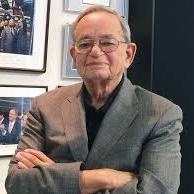Financier Leo Melamed. The Trader Who Changed the Stock Market Forever
In the process of studying the success stories of various traders, it is impossible to ignore the legend of trader Leo Melamed.
Thanks to his efforts, the stock exchange forever changed its appearance, moving away from trading in a huge hall to global network trading.
However, Leo Melamed not only changed the appearance of the exchange, but its very essence, creating derivatives or in more accessible language derivatives.
The contribution of this man to the development of the stock exchange world is simply enormous, but this would never have happened if he had not had to go through the most difficult life path, which we want to introduce you to.
Leo Melamed was born in Poland on May 20, 1932. When the boy was only seven years old, the world was overwhelmed by the Second World War, and Hitler’s troops at that time entered Poland.
However, the family did not feel safe in Lithuania, so they continued to flee east to Siberia. After living for some time in Siberia, the family repeatedly faced hunger and was on the verge of death.
Then the Melamed family decides to flee to the only country not engulfed in fire, where the freedom and democracy of the United States reigned. To do this, they had to first move to Japan and then to the USA.
It is worth noting that at that time Japan had not yet attacked the United States, so there were no problems with the move.
Having gone through this difficult school of survival, Leo Melamed realized what power a simple piece of paper can have, namely various documentation and the money with which it was obtained.
Education and career
Having reached their goal, Leo's family stops in Chicago. His parents quickly find work as teachers in one of the Jewish schools, and stability comes to the family.
After graduating from school, Leo Melamed entered the University of Illinois to study medicine.
However, during his studies, Leo realizes that without a legal education it is quite difficult to find any work with a decent salary. That is why he enrolls at Marshall Law School and successfully completes law courses.

After receiving his education, Leo Melamed was looking for a job, but could not find anything in his profile. Therefore, he decided to find a temporary job and got a job at Merrill, Lynch, Pierce, Fenner & Bean as a regular document delivery person.
Everything would be fine, work is like work, but he delivered documents at the Chicago Mercantile Exchange in the very center of the stock exchange world.
Naturally, seeing how much and how traders earn, Leo Melamed became very interested in this business, so in 1960 he borrowed 3 thousand dollars from his father and bought his place on the stock exchange.
The first asset with which he began trading was pork, and quite successfully. However, Leo Melamed knew how dangerous the stock exchange was, so in parallel with trading, he conducted successful advocacy.
Ten years of successful trading on the floor allowed him to earn a good reputation among exchange participants, so in 1967 he was elected to the board of directors of the exchange.
Creation of derivatives
Leo Melamed was prompted to create derivative instruments by the decoupling of the dollar from the gold and foreign exchange reserves, which naturally should have led to changes in dollar prices around the world.
Realizing that investors would be looking for possible ways to diversify, he decided to create currency futures.
Initially, Melamed introduced futures trading in currencies, and as popularity grew on exchanges, they began to actively implement futures on government bonds, indices and other financial instruments.
Realizing that the active development of derivative instruments needs to be somehow regulated, Leo Melamed created the National Futures Association, which he personally headed. In 1987, Leo Melamed became a co-founder of the GLOBEX electronic exchange.
At that time, all traders were hostile to electronic trading, since they were simply deprived of a piece of bread, since at the moment only they had a monopoly on transactions.
However, an active advertising campaign and a series of negotiations gave these sites the right to life, and now electronic trading takes first place in terms of turnover. Attracting small and medium-sized investors around the world has led to increased market liquidity, and changed him forever.
